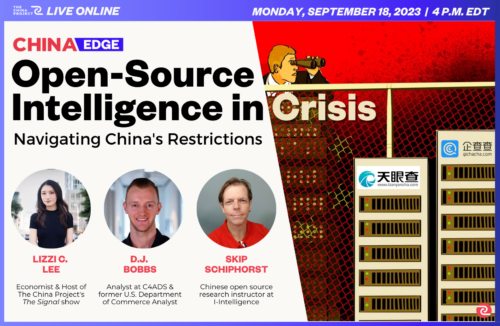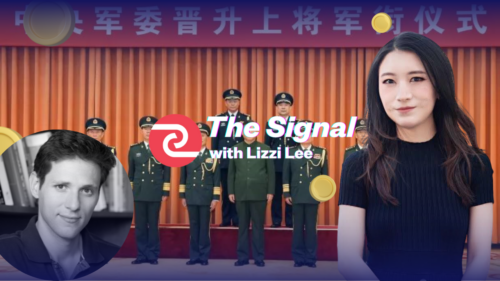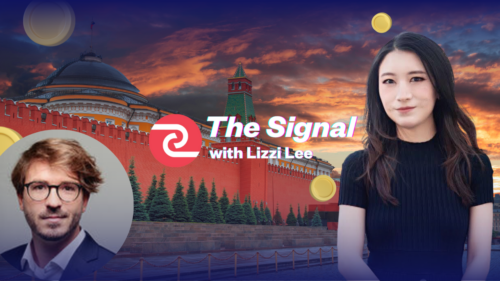What China’s economic strategy means for global business | The Signal with Lizzi Lee
In this week's episode of The Signal, Lizzi Lee speaks with Andrew Cainey and Christiane Prange, the authors of the new book "Xiconomics: What China's Dual Circulation Strategy Means for Global Business." They discuss China's relationship with the rest of the world, and how changes in the economic strategy under Xi Jinping could affect businesses across the globe.

Below is a transcript of the video:
Lizzi Lee: Hello and welcome to this episode of Live with Lizzi Lee powered by The China Project. I’m your host, Lizzi. Joining me today are Andrew Cainey and Christiane Prange, the authors of the new book Xiconomics. Thank you so much for joining me.
Andrew Cainey: Thank you. It’s great to be here.
Christiane Prange: Thank you very much.
Lizzi: So, Christiane, I’m going to turn to you first. Which aspect of China’s econ policymaking do you believe is the most poorly understood, especially in the West?
Christiane: Well, I would say it’s probably the aspect of security combined with the idea of increasing focus on ideology. So President Xi has very much elevated the security level as part of this development, and we see this in the dual circulation approach. At the moment, you can pretty much control what happens inside the country, but not what happens outside of the country. So it’s important that his idea of the party leads everything also will include aspects of security in the future.
Lizzi: Fantastic. A follow-up question for Andrew. In what way does Xi Jinping’s style of economic policymaking or economic management differ from that of his predecessors? And what do you consider to be the most significant differences between Xi Jinping and the previous leaders of China? I think one of the striking points is what is why we called the book Xiconomics. It’s that Xi Jinping is so publicly identified through Xi Jinping thought with the economics, whereas the previous time that was often seen as the remit of the Premier. Now, by definition, as Christiane has just touched on, once it becomes Xionomics. It covers security, national security, as well as economic prosperity and economic development.It is also very clear under Xi Jinping that decision-making has become more centralized and there has been over the years a tendency to reemphasize state direction and state control after a time in which the private sector boomed in many ways without much guidance or oversight.
Your book presents a two by two configuration of China’s relationship with the rest of the world, which I think is fascinating. I wonder if you can tell me a little more about that framework and discuss which scenario you believe is most likely to occur.
Andrew: Absolutely. And it is obviously a very complex situation that we tried to simplify through this two by two matrix and think about what are the relations, particularly between China and the U.S. with China in the West. But one can apply this to the rest of the world. Two dimensions. Firstly, to what degree is the integration between the Chinese economy and the rest of the world? We’re coming out of the period where there’s been ever increasing integration. So is China highly integrated with the West or is it increasingly separated? We have the discussion of decoupling or de-risking. And then the second axis is really what is the nature of that relationship? What is the state of relations between these different parties? Is it essentially one of mutual acceptance or is it one of continuing antagonism? And that two by two matrix leads to four potential outcomes.
The first would be highly connected and essential acceptance. And I would argue that is what we had in globalization up until the mid 2010s. Maybe acceptance, maybe a focus on commercial and economic relations rather than issues of security and values. And then at the other extreme, we have an increasingly decoupled world with lots of antagonism. And those are phrases like the new Cold War or complete separation. And yet we know in practice that’s very, very difficult, very, very difficult to unscramble the omelet, as people say, or to disentangle supply chains, even if there are changes in emphasis. So that it’s more likely we’re going to have some degree of continued connection, but with lots of antagonism. Yes, there’ll be some decoupling, particularly technology, but a lot of antagonism. We’ve called this in the book Intertwined Instability, that things just keep moving and shifting around, and there’s accusations on both sides and genuine disagreements on both sides, but still a lot of integration. The final fourth potential is that there is greater separation, decoupling goes further, but also that there then gets to be some sort of mutual acceptance. I think that’s maybe hard to see at the moment, but that is really the meaning of the phrase one world, two systems, or as we say, in the one and a half systems, because this idea of completely disentangling doesn’t even seem to be realistic.
Lizzi: Your book also devotes a chapter to multinationals’ China strategy. What is your key message to multinational enterprises doing business with China, whether they are localized firms, exporters or importers?
Christiane: Well, the basic issue is China has always been uncertain for multinational companies. They had to deal it with certainty and this will not stop. That’s the first point. Apart from that, what we see is that many Western companies relied on China as a target market. Many companies selling up to 40% of their products in China. And this will become increasingly difficult, especially as China is not looking anymore for Western products and branded products and high-quality products coming from the West because they’ve managed to update the value chain of their own economy to a large degree. So being able to compete in China means that also Western companies need to engage into capability building to offer localized products to the local Chinese market. And there they are heavily competing against Chinese competitors. Just look at the automotive industry. Most Chinese consumers today already have shifted towards buying Chinese cars. So this is one aspect.
The second one is that, obviously companies are constrained by what their local headquarters tells them to do in order to manage their China strategy. So there might be a gap between the strategy at home directed from the headquarters and what companies are actually doing in the subsidiaries. So to reconcile those two points will be increasingly difficult. Also influenced by the situation that is imposed on those subsidiaries by local laws in terms of information transfer, the potential decoupling of value chains that is required in order to have completely separate business in China versus the business they have elsewhere. So to be very clear, in realistic terms, many Western companies need to manage tradeoff between dependence on the Chinese market, in terms of demand, but also becoming independent to make sure that they can diversify their sales to other countries in order to be competitive and survive in the long term.
Andrew: But maybe, maybe I could add a few more points on that. China has always been very different. We’ve seen the experience of Western companies coming in and not understanding the Chinese context and therefore not succeeding. It’s become even more different. More divergence between the markets. And so companies need to adapt to that and respond to that if they’re going to succeed. We would say China remains very open and welcoming to foreign business, but it’s clearer than ever that it’s very much on China’s terms and that may not feel like an open welcome to some Western companies that are coming in. It may mean having party cell structures in your organization. It means obviously following local rule, the local laws, even when they are ambiguous and still under development. And we see a lot of the conflict, uncertainty, that’s arising from that.
And I think the other aspect is that increasingly there’s a China component outside of China as well, and it’s law making in Brussels and law making in Washington, D.C. that is constraining or making illegal certain actions by Western companies. So the China consideration is much more back in headquarters, it’s not just something that happens on the other side of the world in China.
Lizzi: Fantastic. Final question for both of you. So recently we saw some concerning development. You know, there were national security raids to Capvision, Bain Mintz Group, etc., etc.. There is this concern that during his third term, he’s going to turn his focus to national security relative to economic development. Do you think that’s a valid concern? What changes, if any, do you anticipate during Simpson’s third term or even fourth term compared to his previous two terms?
Andrew: I think I would say in terms of intention on Xi Jinping’s part, I don’t see such a great change. We were writing this book leading up to the 20th party Congress. There are a bunch of announcements, their priorities. They’re actually very consistent over the period. And so what it is that Xi Jinping sets out is what he would like to do, I think has stayed pretty much the same. I think what’s unclear is what he then actually gets to do. Security is really important. Is he going heavier on that? Maybe. In this year he is actually trying to go heavier on the economy at the moment because the economy is weak and it’s forcing itself to go that. He may feel greater confidence and want to therefore make some mark, leave a legacy. But he needs to address both security and the economy. In a sense that’s back where we started, that both are there together. He needs a strong economy, but from his perspective, from China’s perspective, he’s feeling constrained by the US semiconductor bans. He is looking at pretty much anything that could potentially be a security risk.
Lizzi: Christiane, any thoughts on this point?
Christiane: Yeah, What I might add to this is we don’t see a big difference probably, but all will follow his idea or the country’s idea of national rejuvenation, which is at the core of Xi Jinping’s strategy. And this heavily builds on dual circulation, especially the internal cycle that is getting stronger and stronger and decreasing dependence on the external cycle: to do business with the external world only when it supports the internal cycle, the business within China. So combining those two issues, national rejuvenation focus on the internal cycle would probably be dominating in the next couple of years. But apart from that, I can only confirm what Andrew said. The country will be open and has to be open for modern technology, and I don’t think we are talking about decoupling. Some people in the West used the term de-risking, but definitely believe that business will continue or the conditions are more determined by China. But Western countries will also have a say in what they bring to China and how they launch collaboration.
Andrew: I would need to turn to this the question of Mintz and Capvision and Bain and other companies under investigation or having individuals arrested, for example, the Japanese pharmaceutical company. I think that reflects the tremendous uncertainty at the moment, trying to understand from the Chinese side what is driving this. Is this part of some integrated campaign or is it, I think, more likely a response to a series of different situations in some areas, concerns on compliance around security in other areas, potentially responding to US action in others? Is it Chinese companies wanting to make sure they’re not breaking the data transfer laws and cutting off some foreign customers from access to data services until those things will be nailed down?Now, that might be right, that might be wrong. And I think the problem is at the moment, everybody is uncertain about how to reconcile these things. And if you’re a businessperson in China and actually a Chinese entrepreneur or a Western multinational, the consequences of being wrong could be quite severe. And yet the benefits of staying there and making and making a good business are also quite significant.






